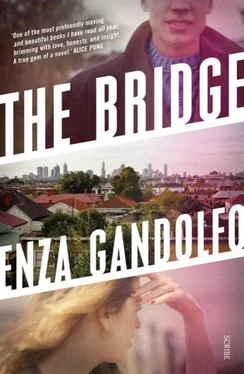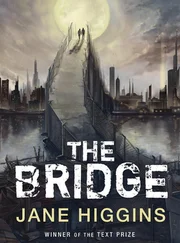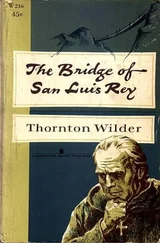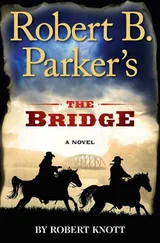After a week of leaving messages, Mani’s mother had returned Sarah’s call. ‘The girls have given their statements to the police. They’re doing VCE. They’ve lost a close friend. We don’t want you to talk to them. Please don’t call again.’
‘I thought they might want to help Jo. She’s their friend too.’
Mrs Cruz’s voice was shaking with anger. ‘She was drunk and driving. And she was fighting with Ashleigh, and she might’ve killed all of them.’ And then she hung up.
The girls almost made it home. A minute or two and everything would’ve been different. How long had it taken for the guards on the bridge to notice Ada: to notice her stop her car, to notice her getting out and making her way to the rail? How long did it take them to run out of the office, to get in their car, to make it to the top of the bridge? Was it a matter of minutes?
The debris from the crash had been cleared. There were several skid marks on the road. The police estimated that Jo was speeding, doing 90 kilometres an hour in a 60 zone. The car spun out of control. Cause unknown. Mani had mentioned oil on the road, but there was no evidence here. If Jo had been sober, alert, not speeding, not arguing, it was unlikely there would’ve been an accident.
When Jo was young, Mary sometimes took her to St Augustine’s on Sundays for the 11.00 am mass. Mary insisted Jo wear a pretty dress and nice polished shoes, for God . Mary wore her best dress too, and sometimes gloves and a hat. She told Jo that women were no longer obliged to cover their heads, but God appreciated it if they did. Jo hated the dressing up, but she enjoyed going to church with Mary, watching the priest in his white gown, and the altar boys — tough kids who played football and cricket on the street — so demure and pious in their lace-trimmed cotton tunics, their hands, washed and scrubbed clean, joined in prayer. Jo loved the way everyone stood up, hymn books in hand, and joined in the singing. She was intrigued by how compliant the adults were, how they sat silent and earnest, nodding in agreement during the priest’s booming sermons on sin or love or forgiveness. And all the sitting and standing and kneeling, and then sitting and standing and kneeling again, reminded her of some of the games they played at school. When her grandmother lined up for communion, the body of Christ, Jo sat alone and watched as the priest placed a thin wafer on each person’s tongue. After church, they went to the bakery to buy fresh bread, and Mr Maxim gave her a wink — ‘All pure now’ — and a warm and crusty dinner roll.
It was at St Augustine’s that she learnt about heaven and hell. She found it comforting to think of Grandpa Tom in heaven smoking his rollies and telling stories. Mandy let her go with her grandmother, but she squashed all notions of a God: ‘There is no God. There’s what there is, and if we aren’t good to each other there is only misery.’
Since her early teens, when she stopped going to church with Mary, Jo hadn’t given much more thought to heaven or hell or God. But now she remembered those sermons. Blessed are those with faith. If only she was as sure as her grandmother that heaven existed.
Did they let killers go to heaven? Would Ash be standing at heaven’s door? Would she put her hand up in protest: She doesn’t belong here ?
From the bedroom, Jo listened to Mandy moving around in the kitchen. Running water. Banging pots. Rattling cutlery. The aroma of bolognaise sauce, fried chicken, and lamb curry, all mixed together. Since the accident her mother spent any free time cooking; the freezer was crammed full with plastic containers of food, waiting. Jo longed to be with her mother in the kitchen, to sit with her at the table, to watch her dish out the pasta, to yell at her for putting too much on her plate, to eat and talk and argue. To have nothing else to talk about except the weather and the news and the loonies at the supermarket and too much homework. This ache for her mother was physical — it was a throbbing pain, laced with regret. Overwhelming regret for all those years she had shunted her mother aside.
Your mother wishes you were dead.
Did her mother wish she were dead?
The night before Ash’s funeral, Jo dreamt she was teetering at the edge of a high cliff. Under her feet the ground cracked, and loose rocks crashed into the surf below. Behind her, people were gathering. If she didn’t jump, they’d push. Had her mother been among them?
She woke, unable to lie still, and paced the room. The torn red dress was still on the floor. She snatched it, scrunched it into a tight ball, carried it out of the house, and dumped it into the wheelie bin. Back in her room, she thought about Ash and how particular she was about clothes. Rae was particular about clothes too, but their tastes didn’t match. Jo knew what Ash liked. She shouldn’t let Ash be buried in just anything. Ash had picked out a dress to buy to wear to their Year 12 formal. It was in a designer shop in a laneway in the city. She wanted to pay it off in $50 installments, but the manager had refused to put the dress aside for her. Rae would hate the dress. It was so short you could see the feather tattoo on Ash’s upper thigh. So short that when Ash lifted her arms, the dress rose above the trim of her white lace knickers. The seams were on the outside. It was black silk with three roughly cut question marks, emerald-green, sewn to the front of the dress. The price tag was $455.
Was that too much to pay for Ash’s last dress?
Should she tell Rae about the dress? Send a text or an email, slip a note under the door?
At midnight, the wind changed and a heavy gust blew the front gate open. The loose windows rattled. The neighbourhood dogs barked and howled, and their owners called out to them. All night Jo was dizzy and nauseous and went back and forth to the bathroom. She knelt on the floor and dry-retched into the toilet. Hanging her head over the bowl, liquid bubbles rising and turning into acid in her throat.
Just before sunrise, she dozed off and dreamt that Rae was running towards the house, wielding a knife, swinging it frantically. When Jo woke up, the dream seemed real. If it was real, soon she’d be as dead as Ash.
She imagined Rae with a gun. Alex hurling bombs through the window.
My parents aren’t killers. Only one killer here, and that’s you.
If someone else was driving, if someone else killed Ash, Jo would’ve been furious. If it’d been Mani or Laura or Kevin driving, if they’d been drunk, Jo wouldn’t be able to forgive them. She’d be sitting in the kitchen of Ash’s house with Ash’s parents, with Jane, and she’d want the driver dead. Death deserved revenge. ‘You killed Ash. You killed her. Die. Die now.’
You owe me that dress.
St Nicholas, the Greek Orthodox church, was several streets away, but the ringing of the bells could be heard in Mandy’s kitchen. Mandy sat in front of a cup of coffee gone cold. It was the morning of Ashleigh’s funeral. But the bells weren’t for Ashleigh. The dead man, Mr Anton, was a customer at the supermarket. Mandy knew him well enough to ask after his health, his wife, and his grandchildren. She knew his taste in cheese — ‘don’t tell the other Greeks, but Bulgarian feta is best’ — and his weakness for expensive prosciutto; she knew which bones he bought for his dog, Misha, and that his diabetic sister craved the Turkish delights they kept on the deli counter, and that he snuck them into the nursing home at least once a week.
Mandy had planned to go to the funeral as a sign of respect for an old man who had a smile and a polite word for the woman behind the counter. He called her ‘darling’ and flirted with her, and even though he was well into his eighties, his harmless flirting made her happy.
Читать дальше












